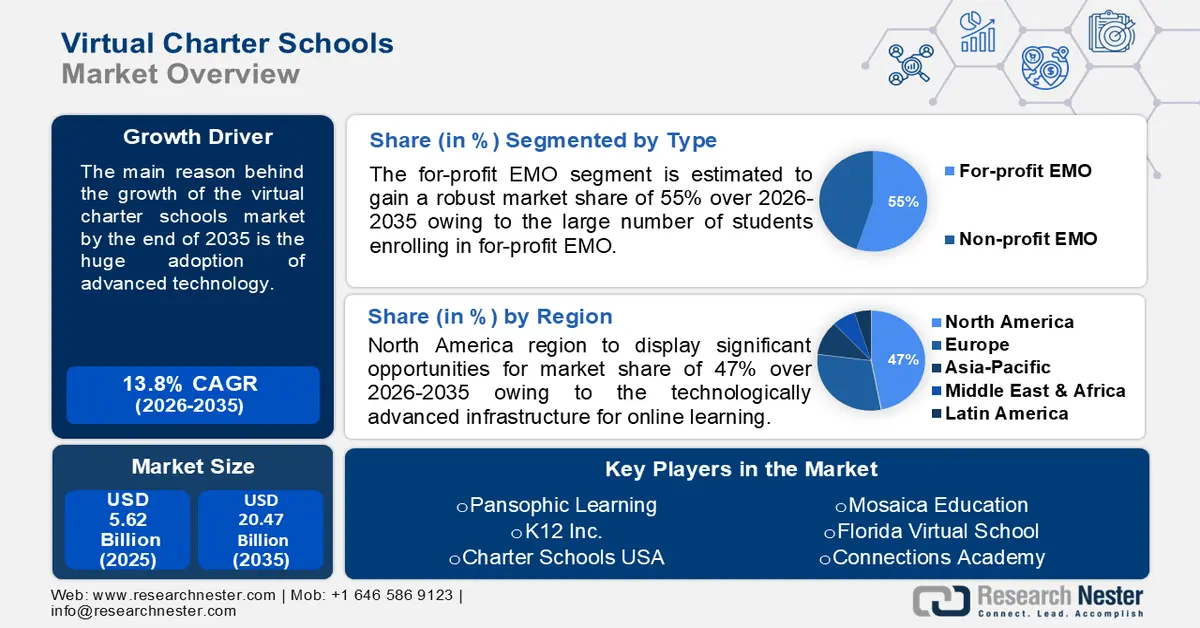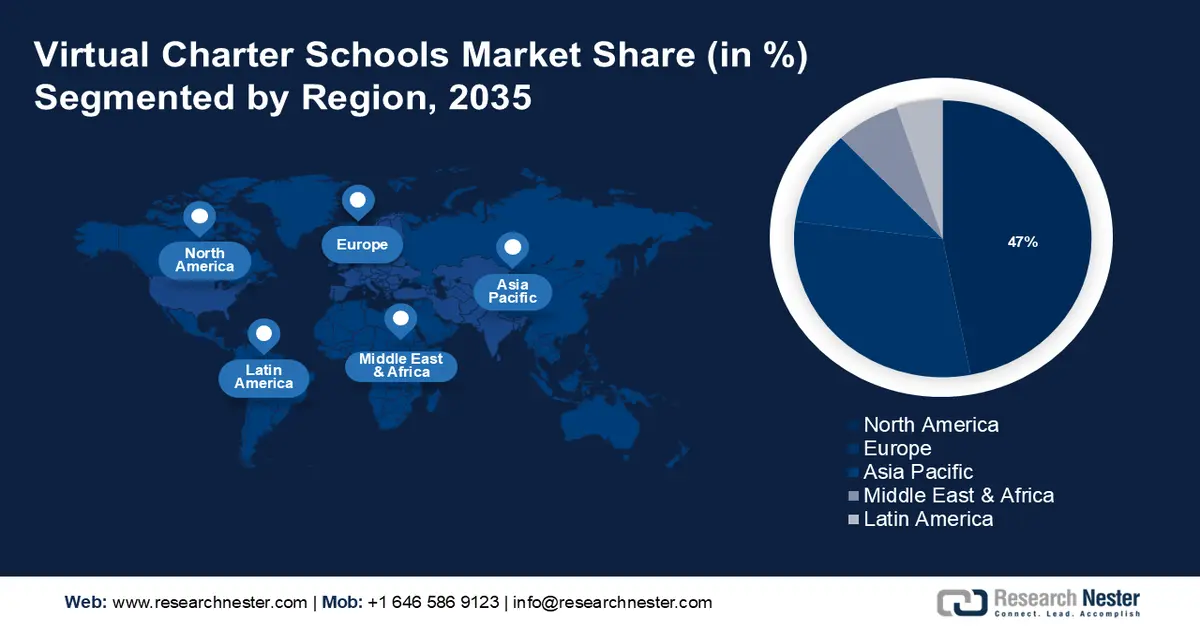Virtual Charter Schools Market Outlook:
Virtual Charter Schools Market size was valued at USD 5.62 billion in 2025 and is expected to reach USD 20.47 billion by 2035, expanding at around 13.8% CAGR during the forecast period i.e., between 2026-2035. In the year 2026, the industry size of virtual charter schools is evaluated at USD 6.32 billion.

The market growth is attributed to the growing awareness about the benefits of online education and the increasing number of internet users. According to our analysts, a total of 5.44 billion people worldwide were using the Internet at the start of April 2024. Furthermore, virtual charter schools provide accessibility in remote areas and ensure flexibility in learning from the comfort of home.
Key Virtual Charter Schools Market Insights Summary:
Regional Highlights:
- North America is estimated to dominate with a revenue share of 47% by 2035, driven by technologically advanced infrastructure for online learning, including the adoption of 5G technology.
- Europe is expected to register significant growth during the forecast period, impelled by the increasing demand for dynamic online courses and continuous upskilling.
Segment Insights:
- For-Profit EMO segment is projected to account for more than 55% share by 2035, propelled by the increasing adoption of for-profit EMO services in corporate and business education programs.
- High Schools segment is estimated to capture over 53% revenue share by 2035, owing to the rising preference for virtual learning among high school students.
Key Growth Trends:
- Huge adoption of advanced technology
- Growing trend of personalized learning
Major Challenges:
- Lack of social interaction
- Limited access to technology
Key Players: Mosaica Education, Pansophic Learning, Nevada Virtual Charter School, Acklam Grange School, Florida Virtual School, Connections Academy, K12 Inc., Charter Schools USA, Illinois Virtual School, Abbotsford Virtual School.
Global Virtual Charter Schools Market Forecast and Regional Outlook:
Market Size & Growth Projections:
- 2025 Market Size: USD 5.62 billion
- 2026 Market Size: USD 6.32 billion
- Projected Market Size: USD 20.47 billion by 2035
- Growth Forecasts: 13.8%
Key Regional Dynamics:
- Largest Region: North America (47% Share by 2035)
- Fastest Growing Region: Europe
- Dominating Countries: United States, Germany, China, Japan, South Korea
- Emerging Countries: China, India, Brazil, Mexico, South Korea
Last updated on : 1 December, 2025
Virtual Charter Schools Market - Growth Drivers and Challenges
Growth Drivers
- Huge adoption of advanced technology - The growing adoption of advanced technology in the education system such as the integration of artificial intelligence, virtual reality, and e-learning courses boosts the market growth of virtual charter schools. Moreover, shifting focus towards online learning which caters to the needs of students with different locations, skills, and backgrounds to provide a platform for interactive learning experiences. According to Research Nester analysis, at least 60% of internet users have indulged in online learning. Additionally, the use of digital tools in virtual schools helps in assigning projects to students to monitor their progress.
- Growing trend of personalized learning - The rising trend of personalized learning to increase flexibility in learning contributes to the market growth of virtual charter schools. The shifting preference from traditional learning to the personalized learning has increased enrollment in virtual charter schools. To facilitate personalized learning efficiently, virtual charter schools are more focused on developing curriculum and adaptive learning solutions by integrating interactive media resources.
Furthermore, the rising need for skill development and effective learning experiences stimulates the market growth of virtual charter schools. - Increasing preference for cost-effective learning methods - There is an increase in the number of students choosing online learning platforms which saves their time and money and contributes to the market growth of virtual charter schools. Commuting to offline institutions or schools to attend classes involves a lot of money spent on buying books and traveling costs.
Moreover, the growing demand for short-term courses which are easily available online at affordable prices and provide repeated access to course material expands the market size of virtual charter schools. According to a recent report, online learning courses have been completed by 49% of students globally.
Challenges
- Lack of social interaction - There is limited exposure and social interaction for students in a virtual learning platform. Less scope for extra-curricular activities, leadership skills, and personality development may affect students’ decision-making capacities and hamper the market growth of virtual charter schools.
- Limited access to technology - Good internet connection and availability of digital devices are required in virtual charter schools. Many students across different locations still do not have proper internet connectivity and technologically advanced devices which may reduce the number of enrollments in virtual charter schools.
Virtual Charter Schools Market Size and Forecast:
| Report Attribute | Details |
|---|---|
|
Base Year |
2025 |
|
Forecast Year |
2026-2035 |
|
CAGR |
13.8% |
|
Base Year Market Size (2025) |
USD 5.62 billion |
|
Forecast Year Market Size (2035) |
USD 20.47 billion |
|
Regional Scope |
|
Virtual Charter Schools Market Segmentation:
Type Segment Analysis
For-Profit EMO segment is set to hold virtual charter schools market share of more than 55% by 2035. The segment growth can be attributed to the large number of students enrolling in for-profit EMO (Education Management Organizations). Moreover, for-profit EMO provides various online educational programs to corporates. Increasing adoption of for-profit EMO services in corporate and businesses boosts segment growth.
Additionally, on-profit EMO ensures the best learning experience for students and also pays more to teachers with specialized knowledge.
Application Segment Analysis
In virtual charter schools market, high schools segment is estimated to capture revenue share of over 53% by 2035. The segment growth can be attributed to the growing preference for virtual learning among students in high schools as it saves them time and helps them to focus on other extra-curricular activities.
According to a report published by the National Education Policy Center (NEPC) in 2019–2020, 477 full-time virtual schools enrolled 332,379 students. Moreover, many courses are not available in high school, which stimulates students to take up virtual courses. Additionally, the huge adoption of advanced technology by high schools boosts segment growth.
Our in-depth analysis of the global market includes the following segments:
|
Type |
|
|
Application |
|

Vishnu Nair
Head - Global Business DevelopmentCustomize this report to your requirements — connect with our consultant for personalized insights and options.
Virtual Charter Schools Market - Regional Analysis
North America Market Insights
North America industry is estimated to dominate majority revenue share of 47% by 2035. The market growth in the region is also expected on account of the technologically advanced infrastructure for online learning such as the adoption of 5G technology.
The growing popularity of educational applications and the surge in the number of smartphone users in the United States stimulate the market growth of virtual charter schools. According to our research, there are 307 million smartphone users in the US as of 2022.
In Canada, various institutions and schools have adopted virtual charter school services and offer online learning courses for students. Moreover, a large tech-savvy population and huge accessibility to advanced technology contribute to the market growth of virtual charter schools. According to a report, over one-half (54%) of Canadians aged 15 to 34 are advanced users and another 23% are proficient users of the Internet and digital technologies.
European Market Insights
The European region will also encounter huge growth in the virtual charter schools market during the forecast period and will hold the second position owing to the greater demand for development and continuous up skilling by offering dynamic courses online to students.
In the UK, the huge presence of various key players providing virtual charter school services and continuous research and development activities to improve the existing infrastructure for virtual charter schools boosts its market growth. According to recent information, education spending is the second-largest element of public service spending in the UK behind health, representing USD 124.6 billion in 2023 —2024 in today’s prices.
In Germany, the integration of new techniques and software to assist students in completing online assessments, projects, and other tasks ensures the efficient working of virtual charter schools and increases the enrollment rate. According to our research analysis, there were 55,753 distance learning participants attending correspondence courses in Germany.

Virtual Charter Schools Market Players:
- Mosaica Education
- Company Overview
- Business Strategy
- Key Product Offerings
- Financial Performance
- Key Performance Indicators
- Risk Analysis
- Recent Development
- Regional Presence
- SWOT Analysis
- Pansophic Learning
- Nevada Virtual Charter School
- Acklam Grange School
- Florida Virtual School
- Connections Academy
- K12 Inc.
- Charter Schools USA
- Illinois Virtual School
- Abbotsford Virtual School
The virtual charter schools market consists of various key players. Some of the companies dominating the market are Mosaica Education, Pansophic Learning, K12 Inc., and Connections Academy among others.
Recent Developments
- Connections Academy - Pearson’s Connections Academy launched a new college and career preparation initiative. Moreover, Connections Academy will offer middle and high school students a career readiness to provide better learning experiences in the field of business and healthcare. Additionally, high school students in the Connections Academy will have free access to Credly to advance their career opportunities
- Mosaica Education - Mosaica Education announced its partnership with the University of Southern California Rossier School of Education to scholarships and various benefits to its schools such as the hiring of experts and talented teachers. Moreover, through this partnership, students will get placements and scholarship opportunities.
- Report ID: 6208
- Published Date: Dec 01, 2025
- Report Format: PDF, PPT
- Explore a preview of key market trends and insights
- Review sample data tables and segment breakdowns
- Experience the quality of our visual data representations
- Evaluate our report structure and research methodology
- Get a glimpse of competitive landscape analysis
- Understand how regional forecasts are presented
- Assess the depth of company profiling and benchmarking
- Preview how actionable insights can support your strategy
Explore real data and analysis
Frequently Asked Questions (FAQ)
Virtual Charter Schools Market Report Scope
Free Sample includes current and historical market size, growth trends, regional charts & tables, company profiles, segment-wise forecasts, and more.
Connect with our Expert
Copyright @ 2026 Research Nester. All Rights Reserved.




